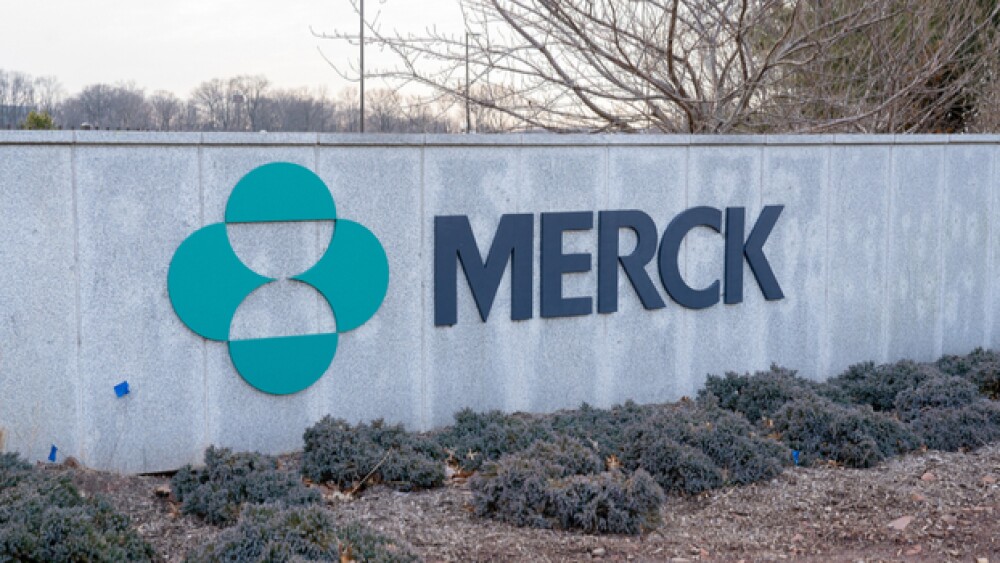If authorized, it could be available in the U.S. before the end of the year. It is also working to submit applications to other regulators worldwide.
JHVEPhoto/Shutterstock
Merck has submitted data to the U.S. Food and Drug Administration (FDA) for Emergency Use Authorization (EUA) for its antiviral pill molnupiravir. On October 1, the company and Ridgeback Biotherapeutics reported interim data from the Phase III trial of the drug for mild-to-moderate COVID-19, which reduced the risk for hospitalization and death in adults by about 50%.
The other antiviral currently approved for use against COVID-19 is Gilead Sciences’ Veklury (remdesivir), which is an intravenous drug. The efficacy data for Veklury is somewhat controversial, and the World Health Organization in November 2020 issued a conditional recommendation against its use in hospitalization, saying there was no evidence the drug improved survival and other outcomes in that patient population.
Other data has supported the drug, including on September 21, 2021, the company reported positive data from a Phase III trial of a three-day course of remdesivir for intravenous use for non-hospitalized COVID-19 patients at high risk for disease progression.
In the study, the antiviral drug demonstrated a statistically significant 87% reduction in risk of COVID-19 related hospitalization or all-cause death by Day 28 compared to placebo. It also showed an 81% decrease in risk for medical visits for COVID-19 or all-cause death by Day 28. In particular, the drug appears to be most effective when used early in the disease.
“The extraordinary impact of this pandemic demands that we move with unprecedented urgency, and that is what our teams have done by submitting this application for molnupiravir to the FDA within 10 days of receiving the data,” said Robert Davis, Chief Executive Officer of Merck.
If authorized, it could be available in the U.S. before the end of the year. It is also working to submit applications to other regulators worldwide.
Although the efficacy of molnupiravir reported so far is very promising, it already comes with some controversy over its likely price. According to the Harvard School of Public Health and King’s College Hospital in London, it costs $17.74 to manufacture, but Merck is charging the U.S. government $712 for the same amount of the drug. Merck inked a procurement deal with the U.S. Government early this year to supply about 1.7 million drug courses upon EUA or FDA approval.
The drug was developed by Merck and Ridgeback Biotherapeutics. In 2020, Ridgeback licensed the drug from Emory University, then two months later sold the global rights to Merck for an undisclosed amount. The Department of Defense’s Defense Threat Reduction Agency offered grants of $10 million to Emory University in 2013 and 2015 for the drug, and the National Institute of Allergy and Infectious Disease also invested $19 million to Emory in additional grants.
Merck has said they would make the drug accessible globally and has already inked licensing deals with five Indian generic drug manufacturers. Those companies plan to price the drug at less than $12 for a five-day regimen of the drug.
Mike Ryan, Executive Director of WHO’s Health Emergencies Program, said pills like molnupiravir are a type of “holy grail” for treatments, although the agency is still waiting to see raw data from the clinical trial.
“If you can stop the virus before it makes someone very sick, then it’s a game changer in that sense,” he said.
Still, vaccinations are the best prevention against the disease, although molnupiravir gives immense hope for halting the progression of the disease in people who do get infected and prevent them from requiring hospitalization.
Pfizer is also working on an antiviral pill, PF-07321332, which might be available by the end of the year. The drug is co-administered with a low dose of ritonavir to prevent COVID-19. The company initiated the global Phase II/III EPIC-PEP study on September 27.





